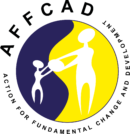Achiiro Lillian is a 26-year-old mother of three living in Mukalazi Zone, Bwaise II, Kampala, Uganda. Before the COVID-19 pandemic, Lillian was working as a hairdresser at one of the salons in Bwaise, but when the lockdown was put in place, her employer informed her that the salon could no longer afford to employ her.
Life became hard for Lillian and her family, especially as her husband—a boda-boda rider—could not fully sustain their home since his income had also reduced.
Lillian lacked the capital to start her own business, yet the bills like rent continued to pile up. That is when she decided to start plaiting people’s hair from her home, as a way of utilising her skill in hair dressing to earn a living.
One afternoon, Lillian was approached by a team from the local council. They asked her for information regarding her current livelihood condition. ‘Initially, I was hesitant to participate in the survey as other people had previously come around registering us, yet nothing became of it. But, this time, I decided to register anyway,’ she recalls. She also explained:
‘Then, one evening, I received a message showing that my account had been credited with mobile money by Children’s Rights and Violence Prevention Fund [CRVPF], and I was so happy because the money came in at a time when I needed it the most.’
CRVPF is a partner organisation of AFFCAD.
Lillian thought carefully about how she would use these funds to support herself and her family. She decided to start a vegetable stall outside her house, alongside plaiting hair from her home, to double her source of income.
Lillian is very grateful to CRVPF for having supported her and her family through such difficult times, as it is through the grant provided to her that she was able to pay school fees for her first-born daughter, who is in Primary 5 as schools re-open this year.



